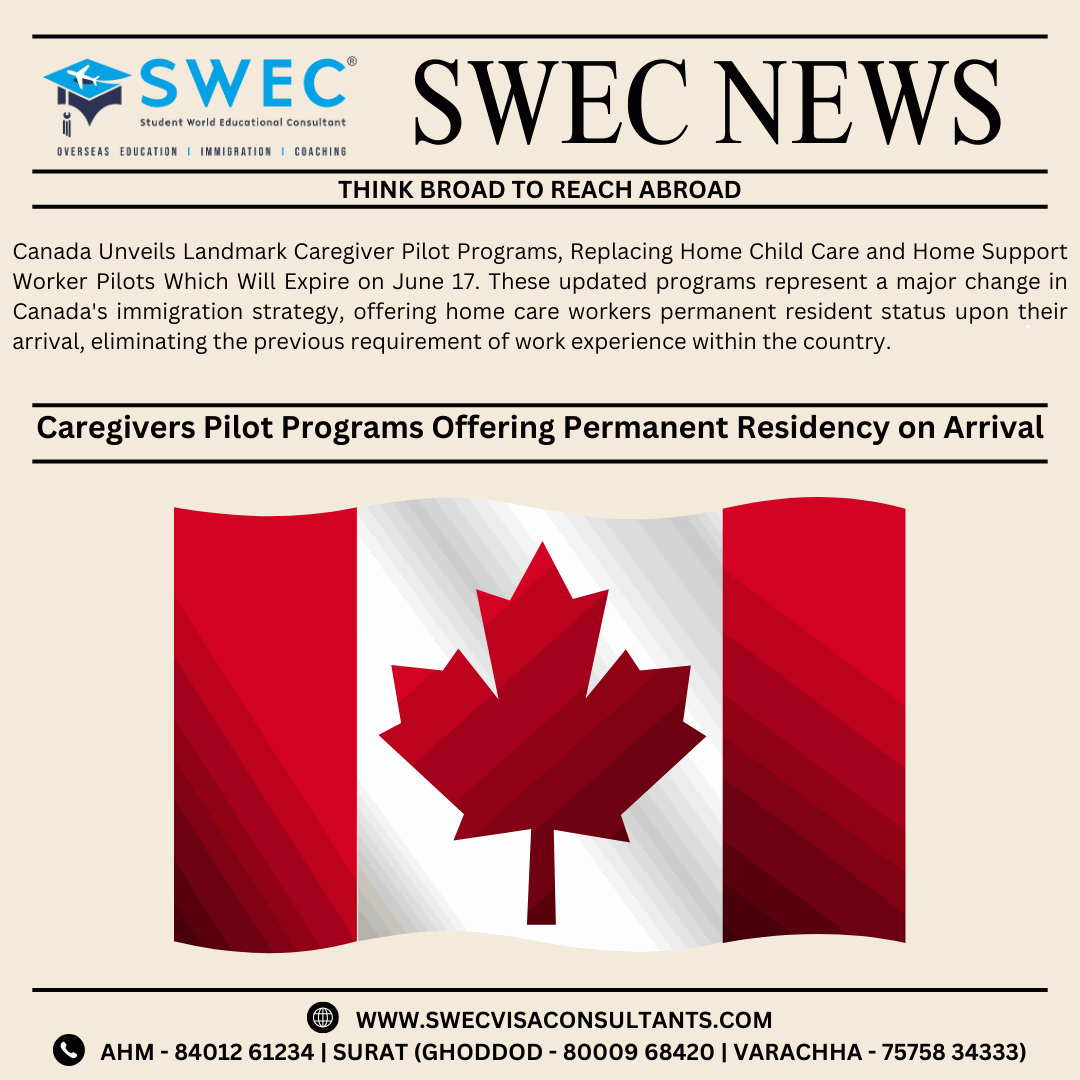In a landmark policy shift, Canada has unveiled new caregiver pilot programs, to replace the current Home Child Care Provider Pilot and Home Support Worker Pilot, which expire on June 17. These updated programs represent a major change in Canada’s immigration strategy, offering home care workers permanent resident status upon their arrival, eliminating the previous requirement of work experience within the country.
Key Changes in the New Pilot Programs
Under these new pilot programs, caregivers will be allowed to work for organizations that provide temporary or part-time care for individuals who are semi-independent or recovering from an injury or illness. This expansion broadens the range of caregiving roles available, providing greater flexibility for both caregivers and employers.
Eligibility Criteria
To be eligible for these programs, caregivers must meet the following criteria:
- Language Proficiency: Achieve a minimum of level 4 on the Canadian Language Benchmarks (CLB).
- Education: Possess the equivalent of a Canadian high school diploma.
- Work Experience: Have recent and relevant experience in caregiving.
- Job Offer: Secure an offer for a full-time home care position.
These criteria differ from the previous pilot programs, which required a CLB level of 5 and a year of Canadian post-secondary education (or its foreign equivalent). Additionally, the older programs mandated at least six months of work experience in Canada, a requirement that has been removed in the new programs. Specific details on the work experience requirement will be provided by Immigration, Refugees, and Citizenship Canada (IRCC). To check eligibility, click here
Recognizing Caregivers’ Contributions
Immigration Minister Marc Miller highlighted the importance of caregivers in supporting Canadian families in an IRCC news release. He emphasized that the new pilots are designed to enhance support for caregivers and ensure that families receive the quality care they need. He stated, “Caregivers play a critical role in supporting Canadian families, and our programs need to reflect their invaluable contributions.”
Rising Demand for Caregivers in Canada
According to Canada’s 2024-2026 Immigration Levels Plan, the country aims to welcome over 15,000 new permanent residents through caregiver programs. Since the launch of the Home Child Care Provider and Home Support Worker Pilots in 2019, approximately 5,700 caregivers and their families have gained permanent resident status as of April 30, 2024.
The need for caregivers is expected to grow significantly as Canada’s population ages. Over the next six years, more than nine million Canadians are projected to retire, which will increase the demand for home and institutional care.
Addressing the Needs of Senior Caregivers
A report by the Canadian Centre for Caregiving Excellence underscored the urgent needs of caregivers in Canada, noting that many are over the age of 65 and may themselves require care. Nearly 20% of caregivers fall into this age group and are the least likely to access needed services or support.
Conclusion
The new caregiver pilot programs demonstrate Canada’s commitment to supporting caregivers and acknowledging their vital contributions to society. By granting permanent resident status upon arrival, Canada is investing in the well-being of both caregivers and the families they assist. As the country faces an aging population, these programs will be essential in meeting the increasing demand for quality care.
For more information on eligibility and application procedures, you can contact us
Frequently Asked Questions
1. What are the new caregiver pilot programs?
- These new pilot programs grant permanent resident status to home care workers upon their arrival in Canada, replacing the existing Home Child Care Provider Pilot and Home Support Worker Pilot.
2. Who is eligible for the new caregiver pilot programs?
- Eligibility criteria include a minimum CLB level of 4, a high school diploma equivalent to a Canadian one, recent and relevant work experience, and a full-time home care job offer.
3. How do the new pilot programs differ from the previous ones?
- The new programs lower the language proficiency requirement from CLB 5 to CLB 4, substitute the need for a year of Canadian post-secondary education with a high school diploma equivalent, and grant permanent resident status upon arrival, eliminating the previous work experience requirement in Canada.
4. What types of care jobs are included in the new programs?
- Caregivers can work for organizations offering temporary or part-time care to semi-independent individuals or those recovering from an injury or illness, in addition to traditional home care roles.
5. How many caregivers does Canada plan to admit through these programs?
- Canada aims to welcome over 15,000 new permanent residents through these caregiver programs as per the 2024-2026 Immigration Levels Plan.
6. Why is there a growing demand for caregivers in Canada?
- The demand is increasing as Canada’s population ages, with over nine million Canadians expected to retire in the next six years.
7. Are senior caregivers supported under the new programs?
- The new programs aim to address the needs of senior caregivers, who are often over the age of 65 and less likely to access necessary services, by providing more comprehensive support.



